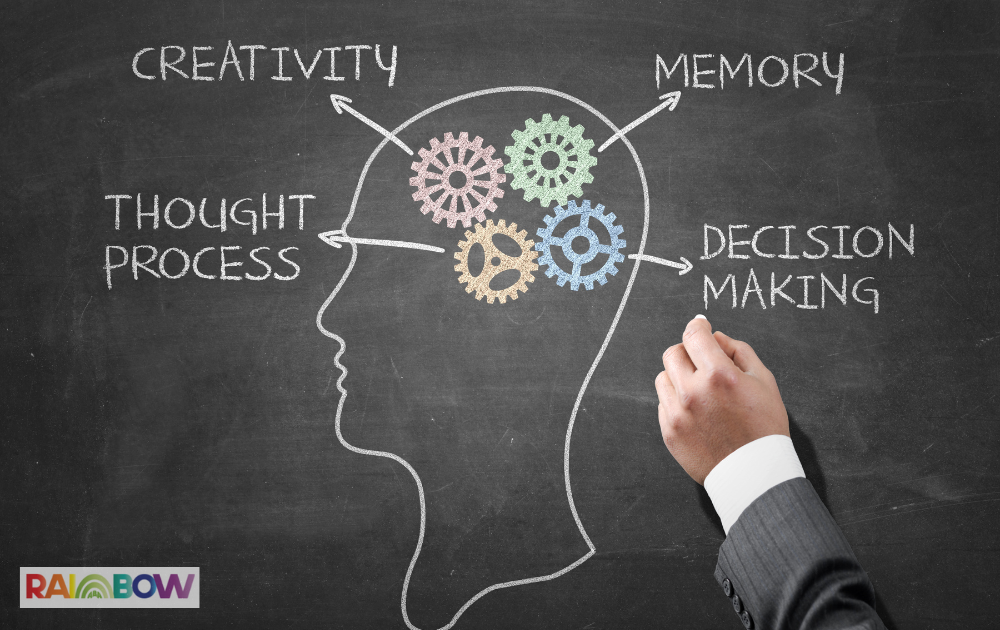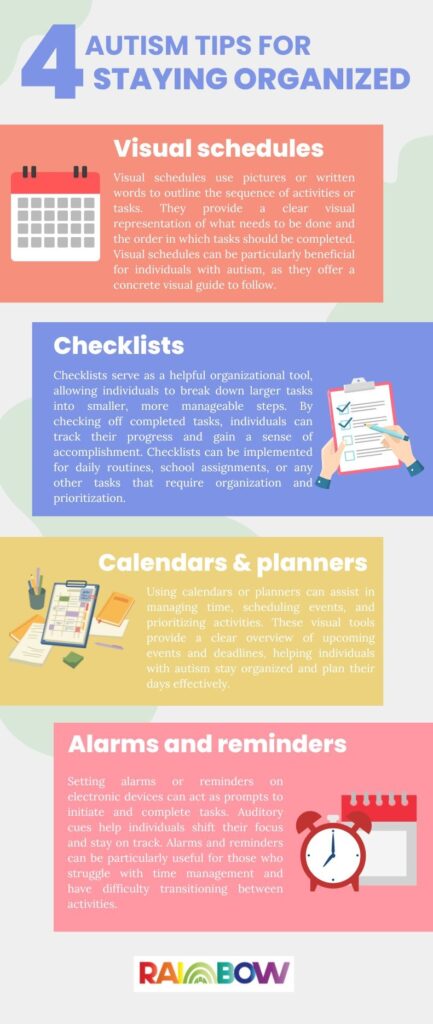Autism Spectrum Disorders and Asperger’s Syndrome are characterized by difficulties in various areas, including organizing, prioritizing, and sequencing tasks. These challenges stem from executive dysfunction, which is a core deficit in individuals with autism. Executive functioning refers to a set of cognitive processes that facilitate goal-directed behavior and self-regulation.

Executive Functioning in Autism
Executive functioning involves a range of skills, including planning, organizing, initiating tasks, maintaining focus, and adapting to changing situations. Autistic individuals often struggle with these skills, making it challenging for them to decide what to do next (sequencing) and determine the importance of different tasks (prioritizing) required to progress towards a specific goal.
Difficulties with executive functioning can manifest in various ways. Individuals with autism may struggle with initiating and completing tasks, managing time effectively, and staying organized. They may have difficulty breaking down complex tasks into smaller, manageable steps, leading to a sense of overwhelm and difficulty completing projects or goals.
Impact on Daily Functioning
The difficulties in organizing, prioritizing, and sequencing tasks can have a significant impact on the daily functioning of individuals with autism. These challenges can affect various areas of life, including personal care, household chores, schoolwork, and employment. Without effective strategies and support, individuals with autism may struggle to meet their responsibilities and achieve their goals.
In addition to the impact on task completion, difficulties with organization and prioritization can also affect time management. Autistic individuals may struggle with understanding and managing time, which can lead to difficulties in meeting deadlines, keeping appointments, and effectively planning their day.
It is important to recognize that executive function skills may develop at a slower pace in individuals with autism, particularly during adolescence. Cognitive flexibility, which involves adapting to new situations and shifting between tasks, appears to be a particular challenge for them. These difficulties in executive functioning tend to persist as individuals with autism grow older.
Strategies for Organization
Understanding and implementing effective strategies can greatly assist in overcoming these obstacles and promoting greater independence and success. The following are helpful tools and techniques for organization and supporting the transition to adulthood.
Tools and Techniques
These strategies aim to provide visual structure, enhance time management skills, and facilitate task completion:

By incorporating these tools and techniques into daily routines, individuals with autism can enhance their organizational skills, improve task sequencing, and foster greater independence.
Transition to Adulthood
As individuals with autism transition to adulthood, it becomes increasingly important to teach them to construct their own supports. This approach empowers them to develop a repertoire of strategies tailored to their specific needs. Here are some considerations to support the transition to adulthood:
- Self-advocacy and self-awareness: Encouraging individuals with autism to develop self-advocacy skills and a deep understanding of their strengths and challenges can facilitate effective self-organization. By understanding their specific needs, individuals can seek appropriate support and accommodations.
- Goal setting and planning: Assisting individuals in setting goals and creating action plans can foster organization and prioritization skills. Breaking down long-term goals into smaller, achievable steps helps individuals with autism navigate complex tasks and stay focused on their objectives.
- Support networks: Building a strong support network is crucial during the transition to adulthood. This network may include family members, educators, mentors, and professionals who can provide guidance, assistance, and resources for organization and prioritization.
Providing the necessary tools, teaching self-advocacy skills, and fostering independence are key aspects of supporting individuals with autism as they navigate the challenges of organizing, prioritizing, and sequencing tasks. By implementing effective strategies, individuals with autism can develop the skills needed to thrive in their daily lives and transition successfully into adulthood.

Cognitive Function Skills
Autistic individuals often experience difficulties in various cognitive function skills, specifically in processing information and problem-solving abilities. These challenges can have an impact on their daily lives and overall functioning.
Processing Information
Processing information efficiently can be a challenge for individuals with autism. They may struggle with the speed and accuracy of information processing, which can affect their ability to understand and respond to various stimuli. Autistic individuals may require additional time to process and make sense of incoming information, whether it be spoken language, visual cues, or sensory input.
It is important to create an environment that supports effective information processing for individuals with autism. This may include providing clear and concise instructions, using visual aids or written prompts to supplement verbal information, and allowing extra time for processing and responding.
Problem-Solving Abilities
Problem-solving skills are another area that can be impacted by autism. Some individuals may find it challenging to identify problems, consider alternative solutions, and evaluate the consequences of their actions. Difficulties in problem-solving can affect everyday tasks, social interactions, and decision-making processes.
To support the development of problem-solving abilities in individuals with autism, it is beneficial to provide explicit instruction and practice in this area. Breaking down problems into smaller, more manageable steps can help individuals with autism approach problem-solving tasks more effectively. Visual supports, such as flowcharts or graphic organizers, can also aid in organizing thoughts and actions, assisting individuals in understanding the sequence of steps required to solve a problem.
By understanding and addressing the difficulties individuals with autism may face in processing information and problem-solving, parents, caregivers, and educators can implement strategies and provide support that promote cognitive growth and development.
Tips from Autistic Adults
Autistic adults offer valuable insights and tips on organization strategies, providing a unique perspective on how to navigate the challenges associated with autism difficulties in organizing, prioritizing, and sequencing. Learning from their experiences can greatly benefit parents and caregivers in supporting individuals with autism. Here are some key insights on organization and effective time management strategies:
Insights on Organization
Many individuals with autism struggle with executive functioning skills, which include planning, staying organized, sequencing information, and self-regulating emotions. As a result, organizing thoughts and actions to determine the sequence of steps required for a task can be challenging. Autistic adults have shared various strategies that have proven helpful in promoting organization:
Breaking tasks into smaller, manageable steps: Breaking down tasks into smaller components can make them feel less overwhelming and more achievable. This approach also helps individuals with autism develop a clearer understanding of the sequence of actions required to complete a task.
Visual supports and schedules: Visual supports, such as visual schedules, calendars, and checklists, can be powerful tools in promoting organization and providing a visual representation of tasks and their sequence. These visual supports assist individuals with autism in understanding and following routines and schedules.
Utilizing color coding and labeling: Color coding and labeling items, folders, or containers can aid in organization by providing visual cues and making it easier to categorize and locate items. This can be particularly beneficial for individuals who struggle with memory and organization.

Time Management Strategies
Another aspect of organization that individuals with autism often find challenging is managing time effectively. Autistic adults have shared helpful strategies for improving time management skills:
Setting clear time limits and using timers: Establishing clear time limits for tasks and using timers can assist individuals with autism in understanding how much time is allocated for a particular activity. Timers can help create a visual representation of time passing and provide a sense of structure and predictability.
Prioritizing tasks: Learning to prioritize tasks can be instrumental in managing time effectively. Autistic adults have found it helpful to identify and focus on the most important or time-sensitive tasks first, ensuring that essential responsibilities are addressed in a timely manner.
Developing routines and schedules: Establishing consistent routines and schedules can provide a framework for managing time and promoting organization. Routines help individuals with autism anticipate and prepare for upcoming tasks, reducing anxiety and increasing productivity.
By incorporating these insights and strategies from autistic adults into daily routines and practices, parents and caregivers can support individuals with autism in developing stronger organizational skills and effective time management techniques. It is important to remember that every individual with autism is unique, and finding the strategies that work best for each person may require some experimentation and flexibility.

Classroom Success
Due to executive dysfunction, individuals with autism may have difficulty completing projects or goals. Some common challenges faced by individuals with ASD in the classroom include:
- Difficulty in organizing materials and assignments
- Trouble managing time effectively
- Struggles with planning and breaking down tasks into manageable steps
- Challenges in prioritizing tasks based on importance
- Difficulty in transitioning between activities or subjects
- Trouble with maintaining focus and attention
To support the academic achievement of individuals with autism, it is important to implement strategies and interventions that address their difficulties in organizing, prioritizing, and sequencing tasks. Some effective strategies include:
- Visual aids and schedules: Using visual supports such as visual schedules, checklists, and color-coded systems can help individuals with autism understand and follow routines and tasks more easily. These visual aids provide a clear visual representation of the sequence of activities or tasks, helping students stay organized and focused.
- Clear and consistent instructions: Providing clear and concise instructions, breaking down complex tasks into smaller steps, and using visual or written cues can help individuals with autism understand and follow directions more effectively. Consistency in providing instructions and expectations can also support their ability to organize and prioritize tasks.
- Individualized supports: Tailoring supports and accommodations to meet the specific needs of each student with autism is crucial. This may include providing additional time for completing tasks, offering preferential seating, or using assistive technology to support organization and sequencing.
- Collaborative problem-solving: Working collaboratively with students with autism to identify their challenges and develop strategies together can empower them to take ownership of their organizational skills. Involving them in the process of finding solutions and teaching them self-advocacy skills can promote independence and success in the classroom.
By implementing these strategies and providing a supportive and inclusive learning environment, teachers can help students with autism overcome their challenges in organizing, prioritizing, and sequencing tasks. It is important to remember that each student is unique, and individualized approaches may be necessary to ensure their success in the classroom and beyond.
Sources:
- https://www.autismspeaks.org/executive-functioning#:~:text=Many%20people%20with%20autism%20have,fit%20into%20a%20bigger%20picture.
- https://learningforapurpose.com/how-to-help-teens-with-autism-with-organization-skills/
- https://aspiewriter.com/2015/08/why-is-it-difficult-for-those-with-autism-to-complete-tasks-or-meet-goals.html
- https://teenage-resource.middletownautism.com/teenage-issues-and-strategies/school-life/common-areas-of-difficulty/organisation-prioritising/

